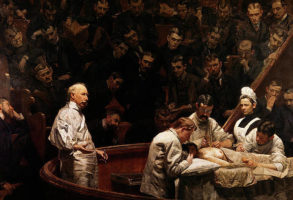Aaron Rothstein
Fellow
Aaron Rothstein, M.D., is an EPPC fellow in the Bioethics and American Democracy Program and an attending neurovascular physician and neuroepidemiologist. He completed his neurovascular fellowship at the University of Pennsylvania and his residency in neurology at the NYU School of Medicine. He received a B.A. in History from Yale University and his M.D. from the Wake Forest School of Medicine.
In addition to his duties, Aaron hosts the EPPC podcast Searching for Medicine’s Soul, which explores key themes in the relationship between human flourishing and the medical field.
Aaron Rothstein, M.D., is an EPPC fellow in the Bioethics and American Democracy Program and an attending neurovascular physician and neuroepidemiologist. He completed his neurovascular fellowship at the University of Pennsylvania and his residency in neurology at the NYU School of Medicine. He received a B.A. in History from Yale University and his M.D. from the Wake Forest School of Medicine.
In addition to his duties, Aaron hosts the EPPC podcast Searching for Medicine’s Soul, which explores key themes in the relationship between human flourishing and the medical field.
From 2014–2021 he was the author of the New Atlantis blog “Practicing Medicine,” which focused on the inner workings of the field of medicine and its theoretical, practical, and ethical complexities. He has also written essays and criticism for the New Atlantis, Public Discourse, the Wall Street Journal, the Weekly Standard, and Commentary.
You can follow him on Twitter @aaronrothstein.
Psychology at Nuremberg
Aaron Rothstein

With Rorschach results and interview notes in hand, did Kelley and Gilbert solve the enigma of Nazi pathology, or, at least, provide the materials for such a solution? Or, to put the question even more modestly, what did their investigations teach us about what Dimsdale calls “the anatomy of malice”?
Articles
Jewish Review of Books / November 22, 2016
All Death is Death Without Dignity
Aaron Rothstein

Advocates for “death with dignity” seem to deny reality, since no human death is truly dignified—even if a person chooses or accepts it. Instead, what ultimately gives death dignity is the kind of life that preceded it.
Articles
Public Discourse / September 23, 2016
Vaccines and Their Critics, Then and Now
Aaron Rothstein

Why skeptics believe what they believe
Articles
The New Atlantis / November 22, 2015
Wisdom of the Sage
Aaron Rothstein

Despite our ignorance about Solomon and his wisdom, we are drawn to this story of a quintessentially enigmatic human figure, with a life that “mirrors our own strivings and doubts.”
Articles
The Weekly Standard / June 17, 2013
Going Viral
Aaron Rothstein

Read this article on the Wall Street Journal.
Articles
Wall Street Journal / August 10, 2012
Mental Disorder or Neurodiversity?
Aaron Rothstein

Embracing, not fixing, mental differences
Articles
The New Atlantis / June 22, 2012
On Seeing the World
Aaron Rothstein

Our world is even more complex, despite having closed many of Seneca’s thousands of doors that open onto death—and this is good.
Articles
The Weekly Standard / May 7, 2012
Bodies Count
Aaron Rothstein

In Stalin’s Genocides, Norman Naimark, the Robert and Florence McDonnell Professor of East European Studies at Stanford, wonders why Lemkin, and those who followed his analysis at the United Nations in writing the Genocide Convention, created a concept that incorporated Hitler’s killings—the attempt to extirpate the Jews was an attempt to exterminate an ethnic group (and nation)—but did not extend as far as Stalin’s murders.
Articles
The Weekly Standard / April 4, 2011
Healing Signs
Aaron Rothstein

We have come very far in medicine, but have still barely plunged into the depths of knowledge of medical science.
Articles
The Weekly Standard / February 14, 2011